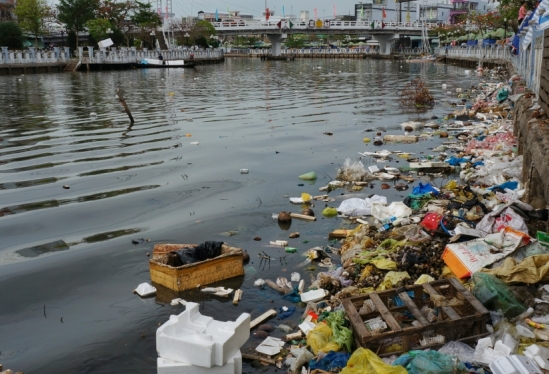New Program Targets Down-River Plastic Waste
Benioff Initiative Takes Public Ideas and Applies Scientists to a Solution

UCSB is launching a new program to curb the amount of plastic waste entering the ocean.
The Benioff Ocean Initiative is providing one team with $3 million to build a plastic-waste capture system in one of several major polluting rivers. According to Douglas McCauley, the director of UCSB’s Benioff Ocean Initiative and an associate professor of marine science, just a few rivers contribute a disproportionate amount to the total plastic waste flowing into the ocean each year — which is estimated to be around 8 million tons and growing. The top polluting 20 rivers — the number one being China’s Yangtze River — account for about two-thirds of the plastic in the ocean.
Plastic-waste capture devices are being used around the globe to clean up some 150 million metric tons of plastic circulating in our marine environments. Last year, a waste-collecting device was deployed to the Great Pacific Garbage Patch by The Ocean Cleanup, a group organized by Boyan Slat in the Netherlands when he was 18. The trash island described to be twice the size of Texas swirls in oceanic gyres between California and Hawaii. In January, the 2,000-foot-long device snapped, delaying the project until at least this summer. Though there are a myriad of ways to collect plastic waste, booms, like the one used by Ocean Cleanup, have become popular waste capture devices for river cleanups. These nifty contraptions are essentially nets attached to large barriers that collect floating waste or redirect it into dumpster-like receptacles.
In addition to cleaning up river waste, the team will be gathering data on the types of items collected. This data will help them propose strategic policy solutions that target the source of the pollution. “Data can be really helpful for turning the tap off and fixing the problem,” McCauley said. In some cases, “turning the tap off” could mean passing a ban on Styrofoam or other major offenders that feed plastic pollution.
The goal of the project is to share the team’s solutions with regions battling pollution and inspire others to implement these solutions in their own rivers. “We’re hoping if we build this is as a blueprint, we can replicate this in other places,” McCauley said.
The program is funded by the Benioff Ocean Initiative, which was founded in 2016 with an initial gift of $10 million from Lynne and Marc Benioff. Every two to three years, the Benioff initiative doles out $1.5 million to fund problem-solving campaigns suggested to the group. The plastic-waste capture system project is the second campaign for Benioff. The Coca-Cola Foundation has also contributed $1.5 million to the program.



